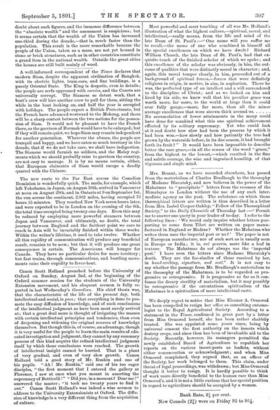Canon Scott Holland preached before the University of Oxford on
Sunday, August 2nd, at the beginning of the Oxford summer session for the students of the University Extension movement, and his eloquent sermon is fully re- ported in last Wednesday's Guardian. His chief thesis was, that the characteristic of the life of the present day, both intellectual and social, is pace; that everything is done to pro- mote the easy diffusion of knowledge, and of such conclusions of the intellectual judgment as have been most surely arrived at; that a great deal more is thought of irrigating the masses with certain intellectual principles and tendencies, than even of deepening and widening the original sources of knowledge themselves. But though this is, of course, an advantage, though it is very useful for the people to learn the main results of edu- cated investigation and judgment, they cannot by any summary process of this kind acquire the refined intellectual judgment itself by which these conclusions were reached. The growth of intellectual insight cannot be hurried. That is a plant of very gradual, and even of very slow growth. Canon Holland told a good story of Mr. Ruskin and one of his pupils. " Ah ! Mr. Ruskin," said one of his too eager disciples, " the first moment that I entered the gallery at Florence, I saw at once what you meant in asserting the supremacy of Botticelli !" "Did you, in a moment P Dear me !"
answered the master ; " it took me twenty years to find it out." Canon Scott Holland's was indeed a wise sermon to address to the University Extensionists at Oxford. The diffu- sion of knowledge is a very different thing from the acquisition of culture.


































 Previous page
Previous page